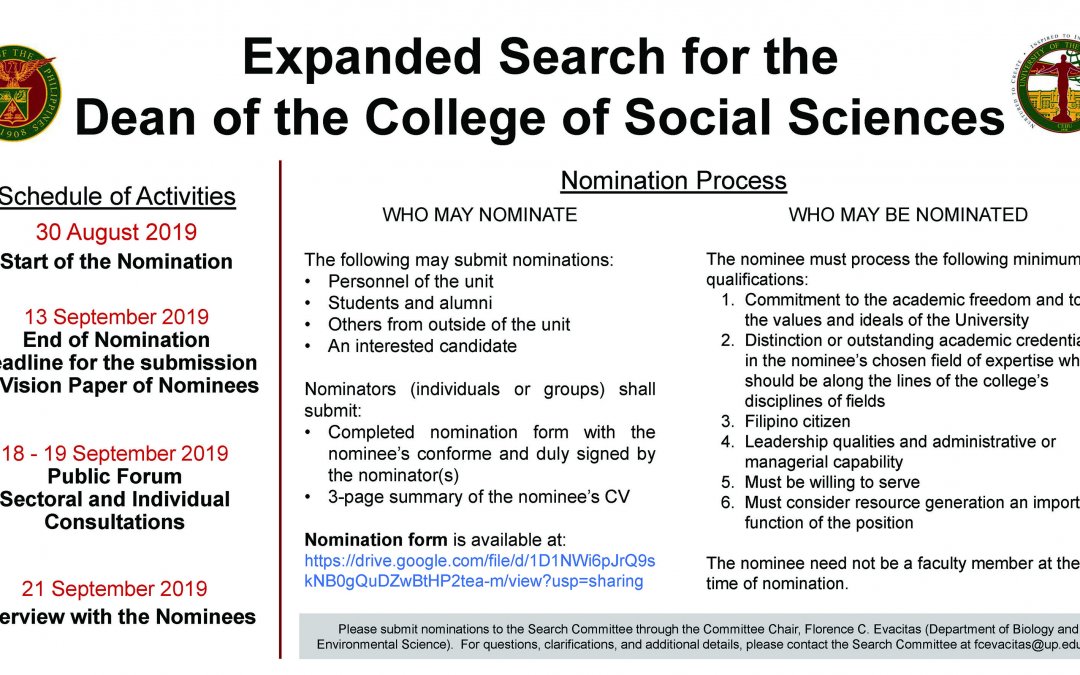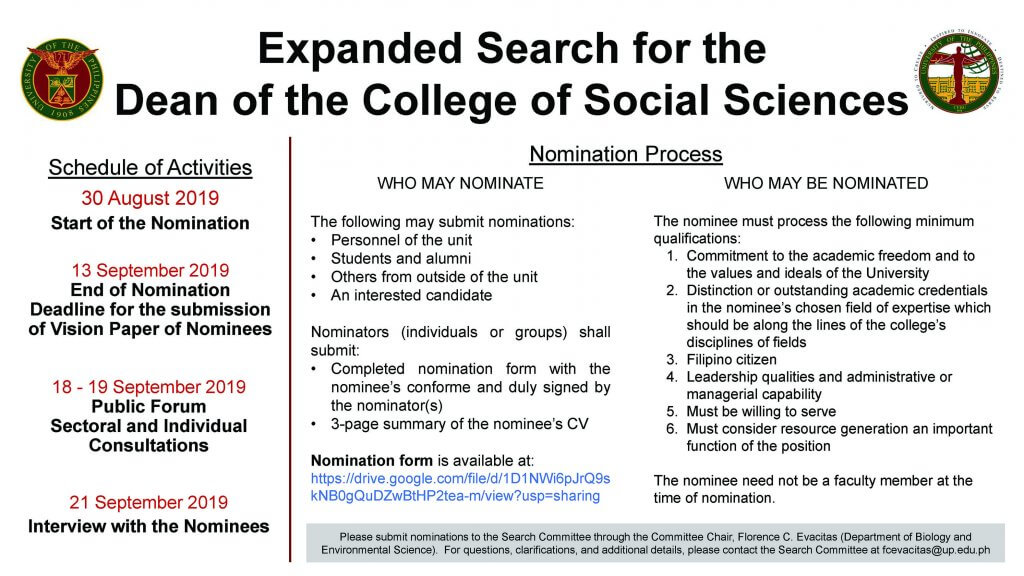VISION-MISSION STATEMENT
Zenaida D. Ligan-Ashburn, M.I.S.
The social sciences are important for a holistic education. With society as the core unit of analysis, as a whole social sciences provides anchor to all aspects of scientific analysis that responds to creating better institutions, systems and creative innovations for social, economic and political development, technological advancements, and natural resource/ecological promotion and climate regulation. It provides students with grounding on long-held universal values and principles of social justice, human rights, sustainable development, tolerance, globalism, inclusiveness, gender sensitivity, good governance, community service, among others. It is geared towards critical thinking, creativity and sensitivity to humanity and ethics.
As we move forward in a globalized world, the relevance of the social sciences becomes more crucial in arming students with the capacity to deal with complexity, of transnational movements of people, goods and services; in forging solidarities amid diverse identities, the broad requirements for balancing sovereign decisions in an integrated and shared global resources; and, of building resilience amid various forms of vulnerabilities. The social sciences takes the lead in breaking silos and facilitating interdisciplinary and multidisciplinary approaches in understanding relevant issues such as climate change, inclusive growth, sustainability, transparency, accountability, corruption, etc., to better understand the world we live in; and, it directly seeks to provide alternative solutions to local, national, regional and global problems.
I envision the College of Social Sciences in UP Cebu to take a key role in advancing socially- responsive and evidence-based policy making and practice through relevant research agenda and curriculum pursued by its programs; as well as become a host to three centers of excellence (i.e. Center for Good Governance and Development; Center for Human Potential Development; and Center for Professional Education) that takes leadership in service provision for the broader Cebuano and Visayan communities across sectors.
Mission: Mandate and Key Program
Building on the achievements of the incumbent dean, Prof. Rowena V. Mende, the plans that are initiated in her term will be carried to fruition.
a. The institution of Bachelor of Basic Education-Master of Basic Education program (BBE- MBE). It is a progressive development for the Master Education Program currently offered by the College. It will also make UP Cebu High School as a true laboratory school for BBE students, strengthening its position as an important and relevant component of a tertiary educational institution.
b. UP Cebu High School. It is a laboratory school for BBE-MBE program and a feeder program for UP Cebu. It is currently focusing on ICT as the core of its curriculum but plans for a Robotics Specialist curriculum is underway. Strong support for this will be given.
c. The institution of a Master of Arts in Psychology. It is in line with the thrust of the university to focus on offering graduate programs and transforms the Psychology Program to a Department of Psychology.
d. The institution of a ladderized graduate program in Global Studies, e.g. Diploma in Global Studies, Master in Global Studies and Master of Arts in Global Studies. This program is unique because it is not offered anywhere else in the region. It is an interdisciplinary program that harnesses the expertise of UP Cebu Faculty. This program is also in line with the thrust of the university in offering graduate programs and will transform the Political Science Program to a Department of Political Science. It will promote the internationalization thrust of the university by establishing linkages with educational institutions abroad that offer the same or similar degree.
e. The institution of a Center for Professional Education. It will serve as the extension office for the Department of Professional Education and geared towards training teachers and administrators, research and resource generation for the College. This center will be headed by a Director.
f. The institution of a Center for Human Potential Development (CHPD). It will serve as the extension office of the Department of Psychology that will provide public service and generate funds for the College by conducting training and seminar-workshops on HPD. Ideally, this center will be headed by a Director who will manage research projects, trainings and seminar-workshop. For example, the CHPD may initiate extramurals Training Teachers in Research Design and Research Methods, conduct training seminars for industrial practitioners, etc. Many more projects can be conceptualized by the director of the center.
g. The institution of a Center for Good Governance and Development (CGGD). This will be headed by a Project Leader at its initial stages and will be headed by a Director once it goes on full-swing. It will serve as the extension office of the Department of Political Science and provides public service through trainings in good governance, voters’ literacy, etc. and will tie up with training/research institutions like the Local Government Agencies of the Philippines Network, DLSU JM Robredo Institute for Good Governance, the Philippine Political Science Association, the Philippine International Studies Association, UP Diliman Department of Political Science, UP Diliman National College of Public Administration. It will also reach out to local universities in Cebu that offers a political science degrees in order to create a consortium for collaborative projects. Faculty members from the different departments of the College will be tapped as lecturers, trainers and researchers, as well as faculty members from other colleges whose expertise are needed for a project at hand. It will generate funds for the College by providing trainings, seminar-workshops and research projects funded by outside sources, eg. CHED, Konrad Adenauer Stiftung, USAID, etc. in addition to what is available in the UP System.
Pedagogy
Learner-centered pedagogy such as flipped classroom, outcome-based education and the Virtual Learning Environment (VLE), are approaches to achieving measurable and tangible results of instruction. Dissemination and publication of syllabi, study materials and instructions to students will be promoted through the use of Information Communication Technology (ICT).
In like manner, the core ideas and concerns of the social sciences can reach a wider audience through the use of ICT. For example, producing workable alternatives to current practice through research-based policy recommendations for local, provincial and national government units and other institutions; producing instructional videos using VLE, Youtube, Facebook and other social media vehicles that are readily available for free use. This is where ICT intersects with the social sciences.
Constituency Development
The College aims to produce students who are able but are not limited to:
a. Provide free legal assistance to the needy;
b. Aid legislators in crafting policy;
c. Become professional practitioners directly involved in organizations serving basic communities;
d. Create new pedagogies for higher education; and,
e. Advocate for better conditions for the marginalized sector.
The Faculty of the College is crucial to achieving these goals and aspirations. Thus, they will be given the encouragement and support for faculty development.
a. Hiring highly qualified faculty will be a priority;
b. Young faculty members will be given the opportunity to pursue graduate studies here and abroad;
c. Non-tenured faculty will be trained on writing publishable materials using Academic Program Improvement (API) funds;
d. Tenured faculty will be encouraged to present papers in local and international conferences and attend disciplinal conferences in order to be updated with current trends in their disciplines. API funds can be tapped for local conferences regardless of whether the faculty is presenting or not presenting a paper in the said conference. The conference is considered a faculty development training in itself;
e. Trainings for all faculty regardless of academic status will be continued through the API funds or through institutional linkages and externally-funded researches; and,
f. Spaces for limited practice and consultancies directly impacting Civil Society Organizations, government policy making and other venues for advanced fellowships and research collaboration will be encouraged.
The Support Staff will be given importance for without them, the College will cease to function effectively and efficiently.
a. Higher item salary levels will be pursued;
b. Additional staff will be hired, one for each program of the College; funding for this will be vigorously pursued; and,
c. Hiring a specialist QA officer whose task is to collate, monitor and write a report on the achievements of the Faculty of the College for AUN/QA qualification.
Finally, support from the Alumni through partnerships with projects will be pursued to carry out what the College sets out to achieve.
Infrastructure and Facilities
To house the College of Social Sciences, I would propose that instead of using the proposed Arts and Sciences Bldg. Extension, all offices, classrooms and laboratories of the College except the High School that have buildings of their own, should be in the Arts and Sciences Bldg. It will be proposed that other offices in the building be transferred to the new ones being built in the campus. Science degrees should be in the Science Bldg. as are the School of Management and the College of Communication, Arts and Design. This will greatly enhance and strengthen the identity of the College of Social Sciences and will foster camaraderie among its faculty, staff and students.
Alternative sources of energy (electricity) shall be pursued to be installed in the AS Building. This will reduce if not totally eliminate the huge electricity bills that the university pays for the AS Building. Initial outlay can be sourced from government departments and agencies and private funding.
In closing, the goals and aspirations of the College of Social Sciences can only be achieved through the support of its constituency and UP Cebu community. Together, we can achieve our goals and aspirations and overcome the challenges that we must face in order to attain them. It takes will, resolve and perseverance to achieve the vision and mission of UP Cebu itself. Nurtured to Create, Inspired to Innovate, Destined to Serve!
Download: Vision-Mission Statement of Zenaida D. Ligan-Ashburn
RELATED:Expanded Search for the Dean of the College of Social Sciences


